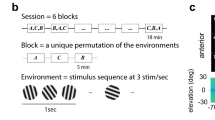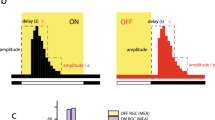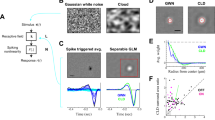Abstract
THE existence in complete darkness of a tonic retinal discharge is well known1–3. There still exist, however, some questions as to its origin and functional significance.
This is a preview of subscription content, access via your institution
Access options
Subscribe to this journal
Receive 51 print issues and online access
$199.00 per year
only $3.90 per issue
Buy this article
- Purchase on Springer Link
- Instant access to full article PDF
Prices may be subject to local taxes which are calculated during checkout
Similar content being viewed by others
References
Granit, R., in Sensory Mechanisms of the Retina (London: Oxford Univ. Press, 1947).
Kuffler, S. W., Fitzhugh, R., and Barlow, H. B., J. Gen. Physiol., 40, 683 (1957).
Arduini, A., and Pinneo, L., Arch. ital. Biol., 100, 415 (1962).
Batini, C., Moruzzi, G., Palestini, M., Rossi, G. F., and Zanchetti, A., Arch. ital. Biol., 97, 12 (1959).
Rushton, W. A. H., Nature, 169, 743 (1949).
Hecht, S., Physiol. Rev., 17, 239 (1937).
Rushton, W. A. H., J. Physiol., 149, 327 (1959).
Rushton, W. A. H., J. Opt. Soc. Amer., 53, 104 (1963).
Author information
Authors and Affiliations
Rights and permissions
About this article
Cite this article
HUGHES, G., MAFFEI, L. Retinal Ganglion Cell Activity in Cats during Dark Adaptation. Nature 205, 601–602 (1965). https://doi.org/10.1038/205601a0
Issue Date:
DOI: https://doi.org/10.1038/205601a0
Comments
By submitting a comment you agree to abide by our Terms and Community Guidelines. If you find something abusive or that does not comply with our terms or guidelines please flag it as inappropriate.



